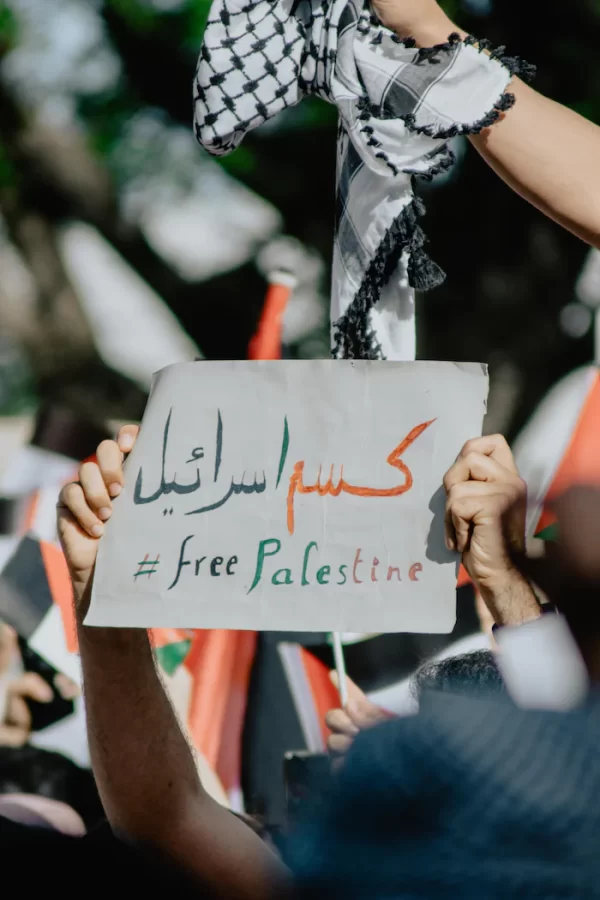Israel-Palestine Conflict
The Ottoman Empire fell in 1922 during the end of the first World War. This territory was placed under the rule of the League of Nations, now the United Nations. Since then, the specific territory of Palestine remains unsettled and under conflict.
During the second World War, there was a mass exodus of Jewish people from Eastern Europe to the Palestinian area, causing strife between people of Jewish descent and people of Arabic and Islamic descent. In conjunction to this, this territory includes Jerusalem, a holy land for people of Jewish, Islamic, and Christian faith.
In Resolution 181(11) the United Nations proposed splitting Palestine into two independent states, one Palestinian Arab and the other Jewish, the city of Jerusalem being internationalized.
One of the states became known as Israel, and expanded into 77% of the other territory of Palestine, including the land of Jerusalem, defying the resolution that was passed. The rest of the territory was controlled by Jordan and Egypt, assigned by the same resolution.
In 1974, the General Assembly determined that the people of Palestine, as affirmed by the Declaration of Human Rights, have the right to self-determination, sovereignty, and national peace.
As the president of the Human Rights Club, senior Blake Behmer believes that protecting the Declaration of Human Rights to all people is essential because it is important to promote “peaceful cooperation,” especially referring to the crisis at hand.
The Human Rights Club goal is to help protect human rights in different conflicts going on in the world.
“Our club is dedicated to promoting the human rights of all people all around the world,” Behmer said. “We really just want to inspire others to work for human rights.”
The year after the General Assembly’s determination, the same body established the Committee on the Exercise of the Inalienable Rights of the Palestinian People, with the Palestine Liberation Organization(PLO) as the overseer of this committee.
Because of the religious aspect to this conflict, there is confusion among the public about whether or not supporting Palestinian sovereignty is anti-semitic, while supporting Israel is promoting an authoritarian government.
“I think it is important not to politicize the issue or really take sides. It is more important to recognize the views of both Palestinian and Israeli people,” Behmer said. “The human rights on both sides are really being offended.”
In 1982, Israel invaded Lebanon with the mission of eliminating the PLO. Although a cease-fire was arranged, there was still a large-scale massacre that took place in refugee camps.
In response to this, in the summer of 1983 the International Conference on the Question of Palestine came into existence to protect the rights of the Palestine people and opposed Israeli settlements in Jerusalem.
From then to 1987, uprisings against the Israeli occupation in the Palestinian Territory resulted in mass injuries and heavy losses to the Palestine people.
In 1991, a Peace Conference was convened in Madrid, Spain with the goal of achieving peaceful settlements and negotiations between Israel and other Arab states, including Palestine.
Because of this conference and subsequent negotiations, the Government of Israel and the PLO formed and signed the Declaration of Principles on Interim Self-Government Arrangements, as well as other agreements.
These agreements led to a partial withdrawal of Israeli forces, along with the elections to the Palestinian Council, and the Presidency of the Palestinian Authority.
Because the state of Israel was continually encroaching on the Palestine area(which was deemed illegal by the International Court of Justice), in 2002 the Security Council reaffirmed the two state solution in Resolution 1397, building upon Resolution 242(1967) and 338(1973).
The same year, the Arab League adopted the Arab Peace Initiative in Beirut, Lebanon in reference to an Arab summit conference in Cairo in 1996. In this summit Prince Abdullah bin Abdulaziz, Crown Prince of the Kingdom of Saudi Arabia called for Israel’s full withdrawal from Arab territories.
A Road Map of the two-state solution was released by the United States, United Nations, European Union, and Russia. This map has many phases including building Palestinian Institutions and creating a transition time period.
In 2011, Palestinian President Mahmoud Abbas submitted an application and was granted as a member state in the United Nations Environmental Scientific Cultural Organization, yet was only granted non-member observer State status in the UN in 2012.
Negotiations that began in 2013 were suspended by Israel in 2014 because of an announcement of a Palestinian national consensus Government. A few months after this, another round of fighting erupted.
Resolution 2334 was adopted in 2016 by the Security Council. This resolution focused on illegal Israeli settlements in Palestinian territory. This resolution worked to reaffirm many other resolutions including 242(1967), 338(1973), and 1397(2002)(all previously mentioned), while also deeming that Israeli settlements have no “legal validity”.
In the past few years, Israeli officers have doubled down on policies securing the Palestine land for themselves and repressing Palestinian rights.
In 2021 the Israeli military air-launched 1,500 targets in the Gaza Strip, killing around 120 Palestinian civilians. In response, Palestinian armed groups launched more than 4,000 rockets towards Israel, resulting in 12 deaths of Israelis and 7 Palestinians. The Human Rights Watch documented these attacks as war crimes.
Advocating for human rights is an important cause for the Cathedral community.
“We have a duty to protect all people in that region,” Behmer said.
During the first eight months of 2021, Israeli officers destroyed over 650 Palestinian homes and other structures, including in East Jerusalem. These acts displaced nearly 1000 people, according to the UN Office for the Coordination of Humanitarian Affairs. As of right now, Israeli forces destroyed over 850 homes.
The same office reported the deaths of 49 Palestinians in August 2022, 17 of them being children. During this same month, 360 Palestinians and 70 Israelis were injured.
Because of Israel’s restrictions to electricity, health care, and water, the United Nations Relief and Works Agency for Palestine Refugees in the Near East reported around 80% of the 2.1 million residents in the Gaza Strip relied on humanitarian aid.
From March to December in 2022, Israeli authorities intensified efforts to control the region, killing 147 Palestinians, including in May a renowned Al Jazeera journalist. During this time, 866 Palestinians were held in administrative detention without charge or trial.
In August the same year, Israeli officers raided the offices of seven prominent Palestinian civil organizations. Along with this, they also outlawed six of the groups, labeling them “terrorist” organizations.
March 31st, 2022 Israel launched Operation Breakwater, a sweeping Israeli military campaign. Since then, Israel has conducted raids of the West Bank nearly everyday, to arrest suspected militants and round up weapons. Because of this operation, Palestinians are killed every week.
This operation is also forcing Palestinian authorities to be trained by the United States and international forces to patrol the West Bank, coordinate with Israeli officials to prevent attacks on Israelis, and patrol the West Bank. That being said, the people of Palestine have lost their trust in this group, believing them to be controlled by Israel.
The casualties in the West Bank have been rising, and have hit a record for highest death toll since 2004. These victims range from gunmen to even uninvolved civilians.
Being an ongoing conflict with no end in sight, many young Palestinians and Israelites know nothing except violence. Yet, there is still hope for a better future full of peace in the Palestine region.
“The world needs to come together and enable peace talks and more cooperation for both sides,” Behmer said.
“We have a duty to protect all people in that region,” Behmer said.

Whenever there is a big new story, whether on campus or off, you’ll find Neve Walker at the heart of it. Neve is a senior at Cathedral, and in her second...





















































